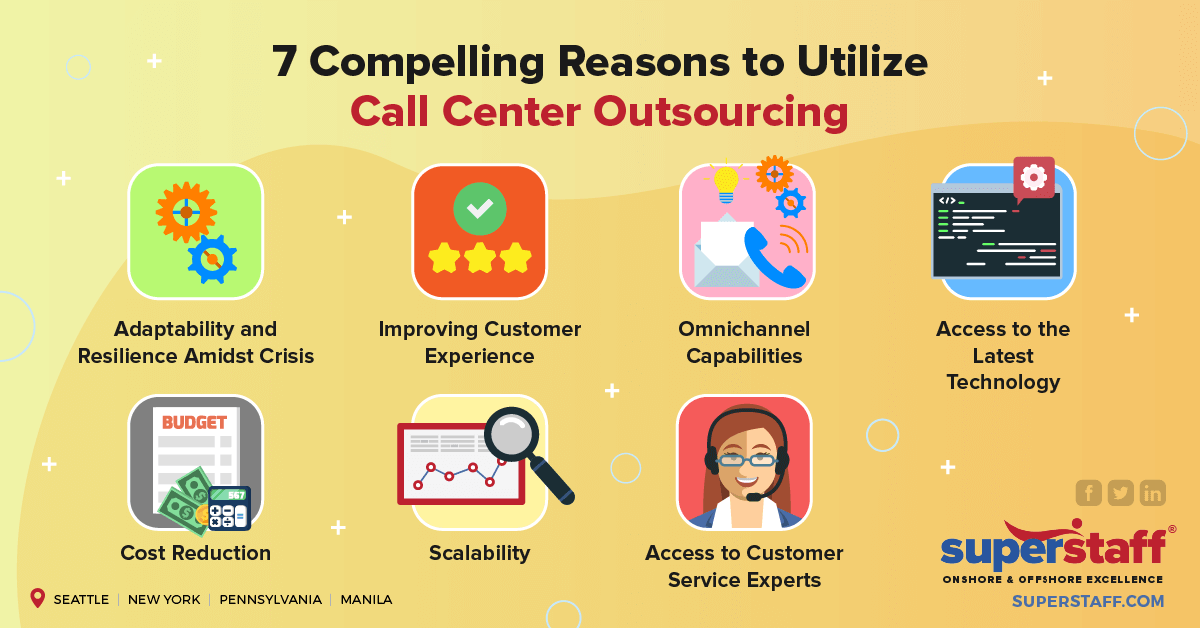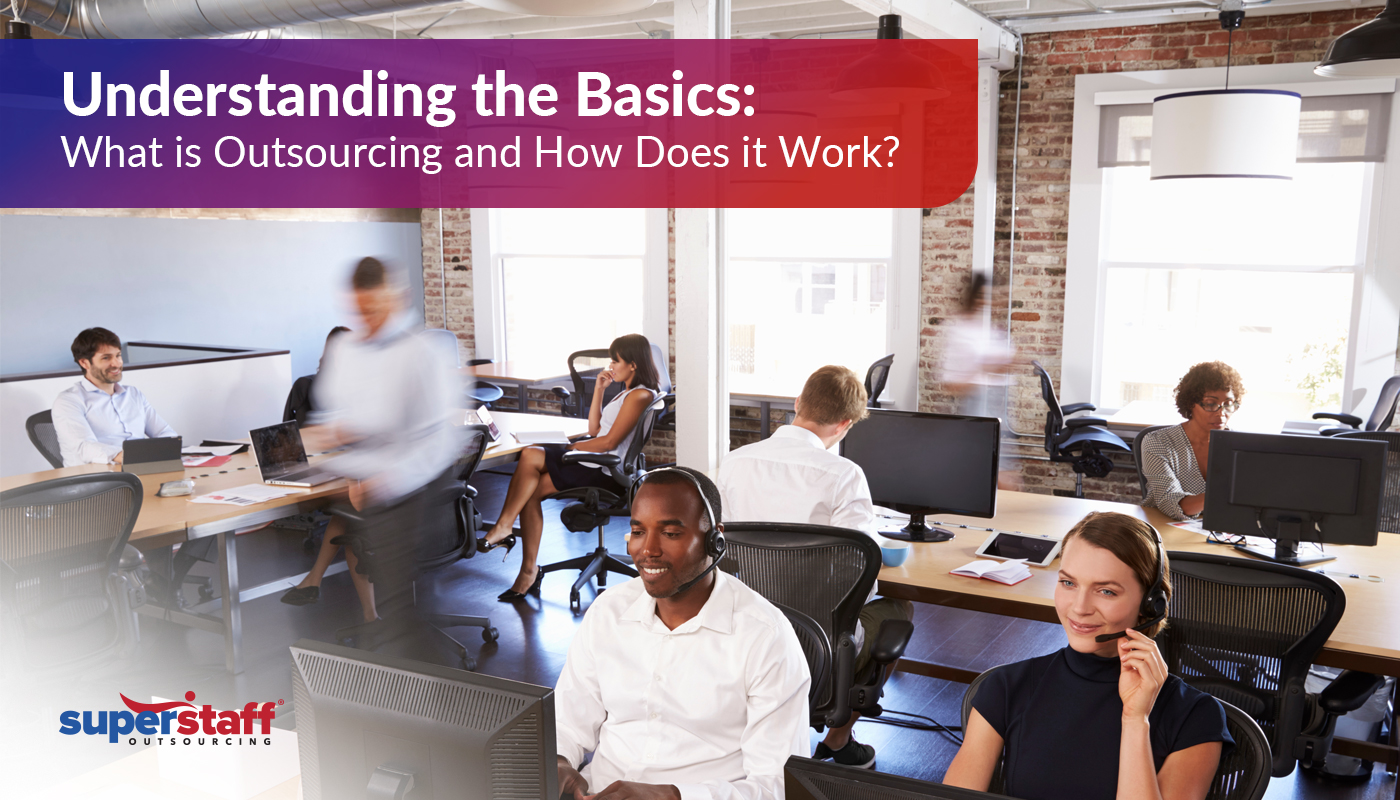
Providing exceptional customer service is more important than ever to remain competitive. Surveys have found that 86% of consumers are willing to pay more, provided that businesses give them a good experience. One surefire way to improve your brand’s customer experience is by investing in call center outsourcing.
Since the COVID-19 pandemic drove consumers to find their needed products and services online, call center agents are now the cornerstone of your customer support strategy. They represent your brand’s commitment to the customer experience and show customers that you care about their needs.
Industry analysts predict that the global market for call center outsourcing will grow by $14.05 billion between 2021 and 2025. This rise in demand for call center services shows that more and more businesses realize their value to their customers and brand. Let’s take a closer look at why investing in Philippines customer service outsourcing is a smart move for businesses of all sizes!
7 Different Ways Call Center Outsourcing Adds Value to Your Business in 2021
1. Adaptability and Resilience Amidst Crises
When the COVID-19 outbreak struck, businesses from nearly all industries significantly suffered the impact, with some even forced to halt operations. However, the pandemic’s changes gave way to new opportunities for those working in the call center outsourcing industry.
The contact center industry rapidly adapted to the new normal, adopting work from home models and utilizing new technologies to their advantage. When you invest in call center outsourcing, you can rest assured that your business is in good hands. Even amid a crisis, reliable call center service providers can adapt to challenges in the environment and keep their heads above the water.
2. Improving Customer Experience
Customer experience or CX remains the name of the game in 2021. Although CX has always been essential to a company’s success, it became even more prominent during the pandemic. According to research by Zendesk, half of all consumers feel that customer experience is more important now than a year ago.
How can businesses keep up with the ever-shifting customer expectations? Invest in call center outsourcing.
Your customer support representatives work closely with customers, allowing them to gather direct feedback about concerns or ways to improve. By partnering with an experienced call center outsourcing team, you can track, measure, and analyze customer satisfaction more efficiently.
3. Omnichannel Capabilities
Today’s consumers want to engage with brands on their terms and use the platforms they prefer. Research shows that businesses that utilize omnichannel customer support retain about 89% of their customers. On the other hand, brands that do not invest in omnichannel capabilities keep only 33% of the customers they gain.
Businesses must allow customers to reach them through various channels, to succeed in today’s competitive global market. So, partner with an experienced call center outsourcing firm. The right outsourced provider can offer 24/7 customer support through different platforms, including phone, email, website, live chat, or social media.
4. Access to the Latest Technology
Another significant advantage of working with a call center outsourcing firm is that they utilize the latest technological advances and innovations. Artificial intelligence and machine learning tools can automate their workflow, generate leads, and increase conversion rates.
An example of this is the AI chatbot, which call center outsourcing providers use to help turn waiting lines into a more positive and efficient experience. Chatbots provide personalized attention to customers and reduce call durations, creating a seamless process for both customers and agents.
5. Cost Reduction
Setting up an in-house team to provide customer support can be costly. You’ll need to develop the necessary infrastructure, hire the right workers, and invest in their training. By working with a call center outsourcing team, you can skip these steps and get the services you need immediately, saving you a significant amount of time and money.
Instead of taking time away from your core business functions, let the expert team of call center outsourcing providers handle your customer support. Now, you can focus on what you do best while ensuring that experienced agents are working round the clock to meet your customers’ needs.
6. Scalability
Whether you need to expand or downsize, the right call center outsourcing company can scale services accordingly. The ideal outsourced team can customize their services according to your specific needs and goals, meaning that you only pay for what you use and save resources for other essential business functions.
7. Access to Customer Service Experts
According to Hubspot’s research, a mere 5% increase in customer retention can lead to a 25% increase in profit. This data tells us that keeping repeat customers may be as important, if not more important, than acquiring new ones. The professionals who offer call center outsourcing services know this, and they will use their expertise to help you retain customers.
Your customer service team represents your brand when interacting with current or potential consumers. As such, it’s vital to work with a call center outsourcing company that has experience and expertise and can deliver proven results.
How Much Does It Cost to Outsource a Call Center?
Now that you understand the value call center outsourcing brings to your organization, you may be asking yourself, “How much does it cost to outsource a call center?” The answer is that costs will depend on different factors, exceptionally where you choose to outsource in the world.
Typically, the cost of onshore outsourcing is more expensive than offshore outsourcing. The average price for call center outsourcing in the United States and Canada, for instance, ranges from $20 to $30. For Western Europe, the cost may be as high as $40. On the other hand, if you opt for Philippines customer service outsourcing, the average price is $8 to $14.
Why Philippines Customer Service Outsourcing Should Be Your First Choice
World-Class Workforce
There is a reason why the Philippines has been called “the contact center capital of the world:” The country has a wealth of talents. Filipino agents are known for being hard-working, empathetic, and customer-centric, which are qualities that consumers value in customer support representatives.
In studies of Southeast Asian countries, Filipinos have been found to have the highest literacy rate at 97.95%. When you opt for Philippines customer service outsourcing, you can access this large talent pool of highly educated and capable workers who can provide the human touch your customers expect.
Value-Driven and Economical Outsourcing Solutions
Cost-cutting measures may be compelling to opt for offshore outsourcing, but these should never be the only factor. Outsourcing services in the Philippines may be more economical than onshore solutions, but the real advantage is the value provided by Philippine call centers.
With the right Philippines customer service outsourcing partner, you can make the most out of your investment. A reliable team will go the extra mile to ensure your business’ success, working 24/7 to boost your brand’s presence in the eyes of your customers.
Work With the Call Center Outsourcing Professionals!
Are you ready to start taking your business’s customer experience to the next level? Reach out to the expert team at SuperStaff BPO. We offer a full range of outsourcing solutions, including call center outsourcing. Get in touch with us, and let’s talk about how we can help empower your brand through stellar customer service!





